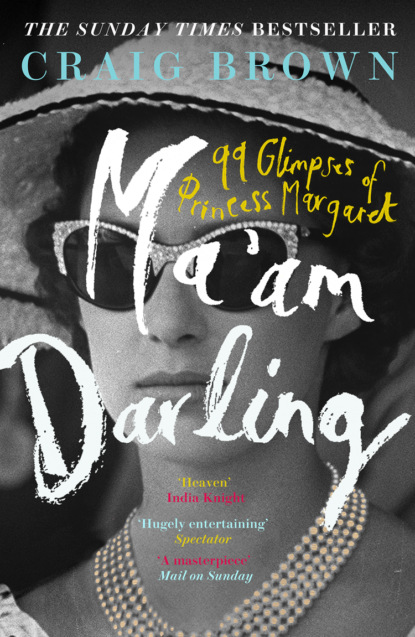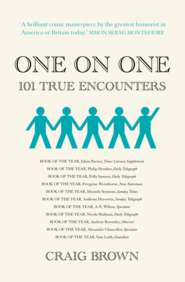По всем вопросам обращайтесь на: info@litportal.ru
(©) 2003-2024.
✖
Ma’am Darling: 99 Glimpses of Princess Margaret
Настройки чтения
Размер шрифта
Высота строк
Поля
I have learned since that the way the Queen signals the end of a conversation is to take one step backwards, but I did not know this at the time. Friends who witnessed our meeting from the other side of the room told me that, during the final half of my discourse on Brecht, Her Majesty took first one step back, then another, then another, then another, but still found herself trapped: for each of her steps back I took a step forward.
Throughout her life, the Queen’s technique of giving nothing away has paid dividends. Nowadays, everyone seems content to interpret her silence as wisdom. The less she says, the more we believe she has something to say. Peter Morgan’s play The Audience and his film The Queen are both predicated on this paradox: her advisers and her prime ministers may prattle away, but, Buddha-like, it is Her Majesty the Queen, with her How long have you been heres? and her Have you come fars?, who remains the still, small voice of calm, radiating common sense.
But her younger sister was another matter. As the second-born, the also-ran, she was denied the Chauncey Gardiner option. She could never have been another whitewashed wall, there for people to see in her whatever they chose to see. To impress on people that she was royal, Princess Margaret had to take the only other path available to her: to act imperiously, to make her presence felt, to pull well-wishers up short, to set strangers at their unease. If I had tried to tell Margaret about Bertolt Brecht she would have interrupted me – ‘Too tiresome!’ – before I had got to the end of the ‘Bert –’. Like a grand guignol version of her elder sister, she took a perverse pleasure in saying the wrong thing, ruffling feathers, disarming, disdaining, making her displeasure felt. One socialite remembers seeing her at a party at Sotheby’s in 1997. By that stage, people were so reluctant to be snapped at by her that there was a sort of compulsory rota system in operation. A senior Sotheby’s figure told the socialite that he would guarantee him an invitation to every future Sotheby’s party attended by Princess Margaret if he would promise to talk to her for five minutes on each occasion.
Compare the Queen’s conversation with Brandreth to Princess Margaret’s dinner-party conversation, as witnessed by Edward St Aubyn and recreated in his wonderfully beady novel, Some Hope.
As the main course arrives, the Princess asks her host, Sonny, ‘Is it venison? It’s hard to tell under this murky sauce.’ A few minutes later, the French ambassador, sitting next to her, accidentally flicks globules of the sauce over the front of the Princess’s blue tulle dress.
‘The Princess compressed her lips and turned down the corners of her mouth, but said nothing. Putting down the cigarette holder into which she had been screwing a cigarette, she pinched her napkin between her fingers and handed it to Monsieur d’Alantour.
‘“Wipe!” she said with terrifying simplicity.’
While the ambassador is on his knees, dipping his napkin in a glass of water and rubbing the spots of sauce on her dress, the Princess lights a cigarette and turns back to her host.
‘I thought I couldn’t dislike the sauce more when it was on my plate.’
The ambassador’s wife offers to help.
‘He spilled it, he should wipe it up!’ replies the Princess. She points to a spot the ambassador has missed. ‘Go on, wipe it up!’ She then complains about ‘being showered in this revolting sauce’. At this point, the table falls silent.
‘“Oh, a silence,” declared Princess Margaret. “I don’t approve of silences. If Noël were here,” she said, turning to Sonny, “he’d have us all in stitches.”’
Before long, Sonny’s seven-year-old daughter appears, having found it hard to get to sleep. Her mother asks the Princess if she may present her.
‘“No, not now, I don’t think it’s right,” said the Princess. “She ought to be in bed, and she’ll just get overexcited.”’
5 (#ubebacbea-06c5-570e-9c15-1d256ab24093)
More often than not, the presence of
Margaret, HRH the Princess
in an index signals yet another tale of haughty behaviour. In the autobiography of Cherie Blair she comes between Mandela, Nelson and May, Brian. The brittle wife of the former prime minister recalls the occasion she was talking to Princess Margaret at a gala performance at the Royal Opera House when the secretary of state for culture came over.
‘Have you met Chris Smith, our culture secretary, Ma’am?’ asked Mrs Blair. ‘And this is his partner …’
‘Partner for what?’ said the Princess.
At this point, writes Cherie Blair, ‘I took a breath.’
‘Sex, Ma’am.’
This reply proved unwelcome. ‘She stalked off.’ But Mrs Blair remains unapologetic. ‘She knew exactly what kind of partner I meant. She was just trying to catch me out.’
Most of the stories follow another arc: the Princess arrives late, delaying dinner to catch up with her punishing schedule of drinking and smoking. At the table, she grows more and more relaxed; by midnight, it dawns on the assembled company that she is in it for the long haul, which means that they will be too, since protocol dictates that no one can leave before she does. Then, just as everyone else is growing more chatty and carefree, the Princess abruptly remounts her high horse and upbraids a hapless guest for over-familiarity: ‘When you say my sister, I imagine you are referring to Her Majesty the Queen?’
At such moments it is as though she has been released by alcohol from the constrictions of informality. After a succession of drinks she is able to enter a stiffer, grander, more subservient world, a world in which people still know their place: the world as it used to be.
She had a thirst for the putdown, particularly where food and drink were concerned. Kenneth Rose,* (#ulink_04a70d5a-f092-56cf-8234-39bbd7434f62) the biographer of King George V, recorded her curt response when Lord Carnarvon offered her a glass of his very rare and precious 1836 Madeira: ‘Exactly like petrol.’ The author and photographer Christopher Simon Sykes remembers her arrival at his parents’ house one teatime. Full of excitement, the staff had prepared a scrumptious array of cakes, scones and sandwiches. The Princess glanced at this magnificent spread, said ‘I HATE tea!’ and swanned past.
In the 1980s she paid an official visit to Derbyshire in order to open the new district council offices in Matlock. Among those on hand to receive her was Matthew Parris, at that time the local Conservative MP. ‘It was 10 a.m.,’ he recalled. ‘I drank instant coffee. She drank gin and tonic.’
Having opened the offices, she was driven to the north of the constituency to open some sheltered bungalows for old people. A dish of coronation chicken had been specially cooked for her. ‘This looks like sick,’ she said.
The mighty and the glamorous were by no means excluded from these rebuffs. In 1970 the producer of Love Story, Robert Evans, and its star, his wife Ali MacGraw, flew to London to attend the Royal Command Performance in the presence of HM Queen Elizabeth the Queen Mother and HRH the Princess Margaret.
‘All of us stood in a receiving line as Lord Somebody introduced us, one by one, to Her Majesty and her younger daughter. It was a hell of a thrill, abruptly ending when the lovely princess shook my hand.
‘“Tony saw Love Story in New York. Hated it.”
‘“Fuck you too,” I said to myself, smiling back.’
It was almost as though, early in life, she had contracted a peculiarly royal form of Tourette’s Syndrome, causing the sufferer to be seized by the unstoppable urge to say the wrong thing. When the model Twiggy and her then boyfriend, Justin de Villeneuve, were invited to dinner by the Marquis and Marchioness of Dufferin in the 1960s, their hostess warned them that Princess Margaret would be among the guests. Before the royal arrival, the marquis instructed them in royal protocol. ‘We were tipped off to stand if she stood, and to call her Ma’am. Fine, no probs,’ recalled de Villeneuve.
Sitting close to the Princess, de Villeneuve was shocked to find that her smoking was seamless. ‘When we started to eat, she lit a ciggie and then continued to chainsmoke, lighting one ciggie off another, throughout the meal. Where’s the protocol in that?’
The Princess ignored Twiggy – at that time one of the most famous women in Britain – until the very last moment. She then turned and asked her what her name was.
‘Lesley, Ma’am. But my friends call me Twiggy.’
‘How unfortunate,’ replied the Princess, and turned her back on her once more.
At this point, Lord Snowdon, never the most loyal husband, leaned over towards de Villeneuve. ‘You will get this with the upper classes,’ he sighed.
‘Well, I think it’s a charming name,’ chipped in the Marquis of Dufferin.
* (#ulink_02fba0b4-6b45-5540-ade1-d1c57f193421) Often known as ‘The Climbing Rose’.
6 (#ubebacbea-06c5-570e-9c15-1d256ab24093)
The Princess liked to one-up. I have heard from a variety of people that she would engineer the conversation around to the subject of children’s first words, asking each of her fellow guests what their own child’s first words had been. Having listened to responses like ‘Mama’ and ‘doggy’, she would say, ‘My boy’s first word was “chandelier”.’
But her strong competitive streak was not always matched by ability. A regular fellow guest recalled one particular fit of bad sportsmanship. ‘We were playing Trivial Pursuit, and the question was the name of a curried soup. She said, “It’s just called curried soup. There isn’t any other name for it. It’s curried soup!” Our host said, “No, Ma’am – the answer is ‘Mulligatawny’.” And she said, “No – it’s curried soup!” And she got so furious that she tossed the whole board in the air, sending all the pieces flying everywhere.’
Her snappiness was instinctive and unstoppable, like a nervous twitch. ‘I hear you’ve completely ruined my mother’s old home,’ she said to the architect husband of an old friend who had been working on Glamis Castle. To the same man, who had been disabled since childhood, she said, ‘Have you ever looked at yourself in the mirror and seen the way you walk?’ Her more sympathetic friends managed to overlook such cruel remarks, believing them to be almost involuntary, or at least misguided. ‘I think she was trying to be cheeky. She thought she was trying to reach a kind of intimacy,’ says one. ‘But she suffered from a perpetual identity crisis. She didn’t know who she was. She never knew whether she was meant to be posh or to be matey, and so she swung between the two, and it was a disaster.’
In the 1990s, two senior representatives from Sotheby’s, one tall and thin, the other rather more portly, came to Kensington Palace to assess her valuables. The Princess asked them what they thought.
‘Well –’ began the tall man.
‘No, not you – the fat one,’ snapped the Princess.
The rebuke became her calling card, like Frank Ifield’s yodel or Tommy Cooper’s fez. Who wanted to sit through her analysis of current affairs, or her views on twentieth-century literature? No one: the connoisseurs wanted to see her getting uppity; it was what she did best. If you were after perfect manners, an early night and everything running like clockwork, then her sister would oblige. But if you were in search of an amusing tale with which to entertain your friends, you’d opt for the immersive Margaret experience: a late night and a show of stroppiness, all ready to jot down in your diary the moment she left, her high-handedness transformed, as if by magic, into anecdote.
Hoity-toity is what was wanted. For most recipients, hosts and guests alike, it was part of a package deal: once she had finally gone and the dust had settled, they were left with a suitably outrageous story – the ungracious royal! the bad Princess! – to last a lifetime. She had a small circle of lifelong friends, loyal to the last. Though they forgave her faults, they also liked to store them up, ready for repetition to others less loyal. ‘Princess Margaret’s friends are devoted to her,’ wrote A.N. Wilson in 1993. ‘But one seldom meets any of them after they have had the Princess to stay, without hearing a tale of woe – how she has kept the company up until four in the morning (it is supposedly not allowed to withdraw from a room until a royal personage has done so); or insisted on winning at parlour games, even those such as Trivial Pursuit which require a degree of knowledge which she simply did not possess; how she has expected her hostess to act as a lady-in-waiting, drawing back the curtains in the morning, and so forth.’
Ever discreet, Kenneth Rose would amuse his friends with the tale of the vintage Madeira (‘Exactly like petrol!’), but would bide his time before putting it into print, for fear of losing his friendship with the Princess. His oleaginous discretion was assured, and this was how he remained a frequent visitor to Kensington Palace. This discretion extended to the moment of Princess Margaret’s death, at which point he employed the anecdote to lend spice to her obituary in the Sunday Telegraph. Her death unleashed many such tales, rising like so many phoenixes from the ashes. For instance, in a diary for the New Statesman, the comedian John Fortune recalled an encounter with her at the BBC Television Centre in the early seventies.







